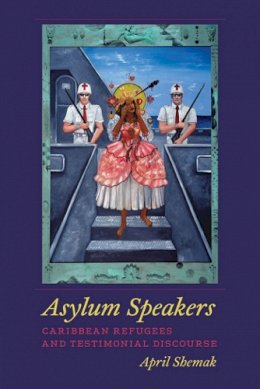
Asylum Speakers
April Shemak
Offering the first interdisciplinary study of refugees in the Caribbean, Central America, and the United States, Asylum Speakers relates current theoretical debates about hospitality and cosmopolitanism to the actual conditions of refugees. In doing so, the author weighs the questions of "truth value" associated with various modes of witnessing to explore the function of testimonial discourse in constructing refugee subjectivity in New World cultural and political formations.
By examining literary works by such writers as Edwidge Danticat, Nikòl Payen, Kamau Brathwaite, Francisco Goldman, Julia Alvarez, Ivonne Lamazares, and Cecilia Rodríguez Milanés, theoretical work by Jacques Derrida, Edouard Glissant, and Wilson Harris, as well as human rights documents, government documents, photography, and historical studies, Asylum Speakers constructs a complex picture of New World refugees that expands current discussions of diaspora and migration, demonstrating that the peripheral nature of refugee testimonial narratives requires us to reshape the boundaries of U.S. ethnic and postcolonial studies.
Product Details
About April Shemak
Reviews for Asylum Speakers
-Elizabeth DeLoughrey University of California, Los Angeles "Asylum Speakers is a timely and important study that performs the necessary task of "breaking the surface of articulation" for refugees. Its readings and analyses of literary and non-literary narratives and utterances by, or on behalf of, refugees seeking asylum in the U.S. helps bring to light the extraordinary stakes-more often than not between life and death-that appears to rest solely upon the spoken word. The study's focus on western hemispheric "forced" migrants to the U.S. from the second half of the twentieth century encompasses an extraordinarily complex mix of political circumstances and global economic reaches all intersected by contested vectors of race, class, and ethnicity. This mix is further complicated by linguistic barriers of language groups and the formal mediations of (mis)translation, non-commensurate levels of education, as well as unstable, fluid locales, physical casualty and debilitation. The refugee emerges through these pages as an extraordinarily compelling figure of our times."
-Fawzia Mustafa Fordham University "Imaginatively 'trespassing' and remaking the borders of Caribbean, US ethnic, and postcolonial studies, April Shemak's book offers an eloquent analysis of refugees and asylum seekers in the contradictory discourses of hospitality. Her range of material testimonial narrative, congressional hearings, photographic archives, and contemporary literature is unique. This is theoretically astute and necessary scholarship that will speak to many constituencies."
-Supriya Nair Tulane University "The transnational framework of April Shemak's excellent book productively brings together postcolonial, American and Caribbean studies and will surely make an important impact in the humanities."
-Elizabeth DeLoughrey University of California, Los Angeles
